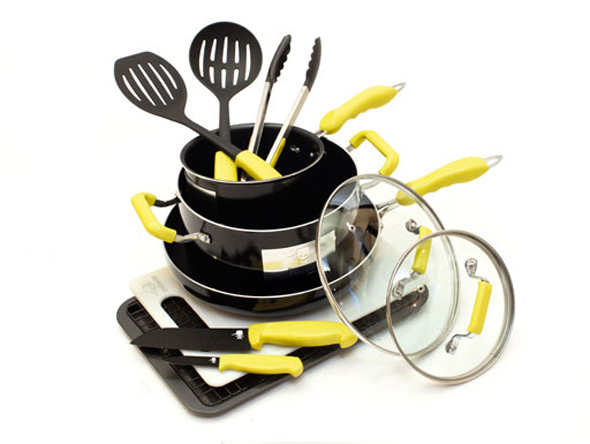1. What Equipment do I need?
You most likely are trying to keep costs down, so keep the equipment to the bare essentials you need to thrive in your own kitchen. A couple of cheap baking pans and a cheap casserole dish will be great for your oven. On the stovetop, you don't need more than a basic frying pan, a saucepan, and a pot. You do need knives for chopping and cutting boards to this one, but cutting boards can be cheap, and you only really need three knives: a chef's knife for chopping, a serrated edge knife for cutting and slicing, and a paring knife for vegetables. Get some cooking utensils, such as tongs, whisks, and cooking spoons, as well to help you cook. Apart from that, you really just need a colander and a couple of cheap mixing bowls, and you'll be set! This stuff can last you for a long time, even beyond college, so if you do want to invest in good quality equipment, feel free to do so! However, you don't need to spend a fortune on cooking equipment. The below set, for example, will cost you under 100 bucks and do pretty much everything you need in a college student kitchen!
 |
| Example of a basic cooking equipment kit of just the bare essentials. From EpicMealTime. |
Some extra cooking equipment things to consider are rice cookers and toasters. They help cook things quickly, but aren't a necessity since you can steam your own rice and toast with your oven.
2. What basic ingredients should I have in my kitchen?
A lot of dishes and foods are going to use some certain ingredients, so it's key to at least have these in your fridge. Fortunately, they are all cheap. Here's a list of some ingredients I find using almost everyday in the kitchen:
1. Salt and pepper. The two most crucial seasonings known to cooking, they flavor foods and draw out natural flavors in a way nothing else really can. These are a must no matter what you are making.
2. Garlic. Garlic is widely used across most food cultures, and is great for just about any savory dish you are trying to make. The storage life on garlic is great too, and it can help to boost your health! Definitely keep a jar of minced garlic or even frozen cubes of it in your storage.
3. Baking ingredients. These are your basics, like baking powder, flour, and sugar. These can be used in more than just baking, and come in handy in the kitchen a lot. For example, I like to use a bit of sugar to mellow out spicy dishes, and flours are very common in rouxs.
4. Oil. Used in almost all savory cooking and to grease baking pans, this is an absolute must in your kitchen. Have a neutral oil like canola or safflower oil at the absolute minimum to help cook and grease at the same time. If you want to punch flavor more into your savory dishes, also consider getting olive oil and sesame oil, as they both add great flavor to dishes.
5. Starches. Your main source of energy comes from carbs, and having a good amount of these stored up will help making cooking quicker and more effective. Purchase things like rice, pasta, or beans that can keep for a long time in storage and you just need to add water to in order to cook and enjoy.
6. Spices. This could be a whole section on its own, but I'm going to simplify it into this. Spices are extremely important for cooking, because food doesn't have too much flavor otherwise. If you want to make delicious food, invest in some spices, particular dried ones. They can last you for over a year in storage and make dishes so much better. The basic spices you want to get are: Oregano, thyme, turmeric, parsley, rosemary, sage, nutmeg, garlic powder, onion powder, paprika, cayenne, and basil. Some great additional spices to get if you can are ginger, curry powder, marjoram, cardamom, clove, allspice, white pepper, dill, cinnamon, garam masala, chili powder, and a whole host more of spices! I personally have around 20 spices in my spice rack at my apartment, and all of them get used frequently.
3. What about perishables?
You can purchase whatever perishables you want as long as you can cook them! There's a great amount of things available, from fresh produce to meats and fish, eggs, vegan products, and more! I cook with all of these things, and will be showing you a lot of my favorite recipes as this blog goes on from all different areas.
4. How do I not spend too much time in the kitchen and more time studying?
Plenty of advanced prep is great. Cutting your vegetables the night before or preparing food before hand is a great way to keep yourself from spending too much time in the kitchen. Slow-cooking and one-pot dishes are also great, as these can last a long time and be made in large amounts so you only have to cook once for the whole week. And stay organized with your prep work, that will definitely be key as well.
Well, that's all I have for tips. Follow these, and making all of the recipes I put on this blog will be a piece of cake and simple! You won't have to spent too much time or break your budget. Get cooking!





No comments:
Post a Comment